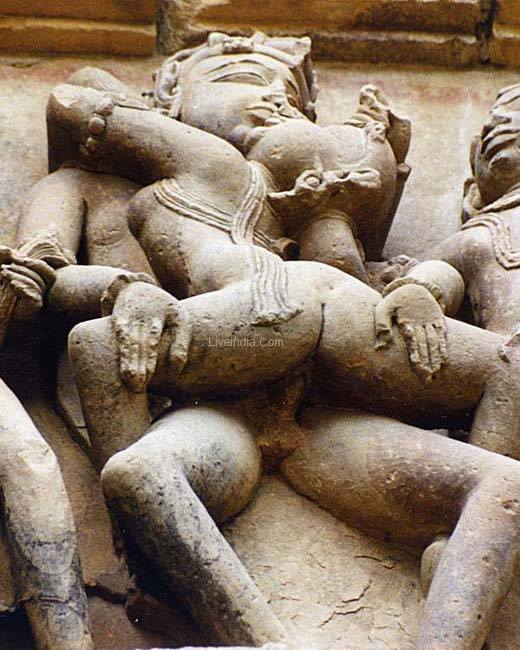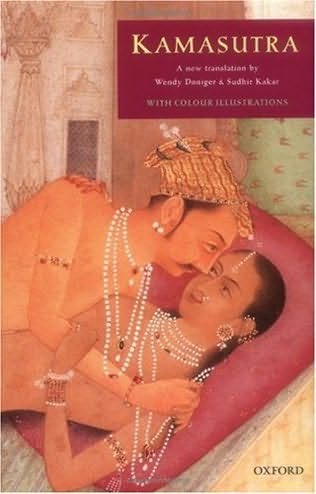India witnessed a powerful protest for last few weeks since November 2, 2014 namely ‘Kiss of Love’. This is a protest where people kiss in public to register their protest against moral policing. Many of the supporters of Kiss of Love protest (hence forth KoL) has referred to elements of the tradition: the sculptures in Khajurāho temples, texts such as Kāmasutra, Gitā Govinda, religious gatherings such as Kumbha mela etc. to make a point in arguments. They points out that all these elements of tradition which mentioned above indicates that emphasis on sexuality, nudity, eroticism etc. are part of the tradition (by presuming that art and literature often reflects tendencies in traditions/cultures).
Is it the case that though they -these supporters of KoL- seemingly opposing the moral policing of Hindutva, they are implicitly exhibiting a commitment to Hinduism, if not to Hindutva, by referring to elements of tradition? Some seem to think so. Do you think so? I do not think so: I do not think that the fact that many of the supporters of KoL has referred to some such elements of tradition indicates their commitment to tradition, Hinduism, or Hindutva. Why do I say that?
Please consider 2 types of arguments related to the Kol:
1. Argument from tradition (AFT): Many who opposes KoL, has argued that activities such as expression of affection in public is not in compliance with our (Indian) tradition. Therefore KoL is not acceptable. Let me call this argument as ‘argument from tradition’ (AFT).
2. Argument from internal contradiction (AIC): Many who supports KoL points out that the AFT (‘argument from tradition’ mentioned above), is fraught with difficulties. This is because of the fact that there are elements in the tradition itself which will undercut AFT by resulting in a contradiction . Let me call this argument as Argument from internal contradiction (AIC).
Some who have discussed about KoL, it seems to me, have invoked the following argument: those who present AIC (Argument from internal contradiction) are committed to tradition in a disguised manner. Many supporters of KoL have invoked, AIC. Therefore, they conclude, many supporters of KoL are committed to tradition. As far as I can see, such a conclusion does not logically follow. One can clearly see that such a conclusion does not follow, if one construes and examines the premises of the argument carefully.
Please consider the following:
Suppose R holds Tb, a theory T about b. How does someone else, let us say K, criticise R for holding Tb? Two important techniques to do it are the following:
Case1: First technique is: show that if R were to consider Xb, another theory X about b, then R can no longer hold Tb rationally (Showing this will involve to show that in some important way Xb undermine Tb).
Case 2: Second technique is: show that if R were to consider the details of Tb, then R will see that there are propositions t1 and t2 within the theory Tb which are contradictory. Thus R can no longer hold Tb rationally.
In the above mentioned two techniques of criticising a theory, the latter is stronger than the former. This is so because:
(a) In case 1, R can (rationally) say that (s)he does not believe Xb (the alternate theory) and does not take it seriously (due to reason z).
(b) In case 2, R cannot (rationally) say that (s)he does not believe in t1 or t2 and thus does not take it/them seriously. R cannot (rationally) say this since t1 and t2 are subsets of the set Tb to which R is committed.
The second approach criticises the theory Tb in its own terms. The first approach criticises the theory Tb in terms of/ by making use of some other theory. Criticising a theory in its own terms is stronger than criticising a theory in terms of/making use of other theories. That is to say that case 2 is stronger than case 1. It is stronger since, in this case the advocate of the theory cannot defend by saying that (s)he does not believe in t1 or t2 (since, as I already mentioned above, t1 and t2 are subsets of the theory Tb to which R is committed to). That explains, I believe, as to why case 2 is stronger than case 1.
Illegitimate charge on the critic: While the critic K points out the contradictory nature of t1 and t2, K need not be committed to t1, t2, or Tb. Thus, the claim that K is committed to Tb does not logically follow from the fact that (s)he has referred to t1 and/or t2. Claiming that K has a commitment to Tb is to make a (logically) illegitimate charge against K. (It very well can be the case that K is indeed committed to Tb, but the point here is, one cannot make this claim on the basis of the kind of argument provided . One needs some other argument(s) to show that indeed K is committed to Tb)
Unfortunately, in many of the discussions on KoL, I am afraid, this ‘illegitimate charge on the critic’ (which is mentioned above) is presumed. Once such scenario is as follows: many of the supporters of KoL has pointed out that, the sculptures in Khajurāho temples, texts such as Kāmasutra, Geetā Govindam, religious gatherings such as Kumbh mela, etc. are also part of the tradition which the proponents of AFT (Argument from tradition) invokes. But these elements of tradition are explicit in describing sexuality, nudity, eroticism etc.
That is to say that there are elements in the tradition itself -which AFT invokes- that will undercut the claim made by AFT: the claim that activities such as expression of affection in public, emphasis on sexuality, nudity etc. is not in compliance with our (Indian) tradition. They (some of the supporters of KoL) were simply pointing out that all these elements of tradition which mentioned above indicates that emphasis on sexuality, nudity, eroticism etc. are very much an acceptable part of the tradition (by presuming that art and literature often reflects tendencies in traditions/cultures). That is to say that invoking AFT to criticise KoL is fraught with difficulties. Pointing out this problem of AFT no way implies (logically) that the one who points out these elements of tradition is committed to the tradition or any of its subsets: it does not logically follow.
That is to say that if K points out t1 or/and t2, It does not imply that K is committed to Tb, t1 or t2. When a KoL supporter points out elements in tradition such as the above mentioned ones -(the sculptures in Khajurāho temples, texts such as Kāmasutra, Geetā Govindam, religious gatherings such as Kumbha mela etc.)- (s)he is making the argument namely AIC (Argument from Internal Contradiction) against AFT (argument from tradition).
As I already explained, AIC is a stronger argumentative technique (because of reason ‘a’ and ‘b’ that I already elaborated) than many other techniques (such as Case 1 that I explained). That shows in what way referring to the elements of tradition such as the above mentioned kind is an important argumentative strategy against AFT.
That makes it clear that the supporters of KoL who refers to elements of the tradition to points out the contradiction in AFT no way are (logically) implying that they (the supporter of KoL) are committed to the tradition, Hindusim or Hindutva in any explicit or implicit manner. To deny this, which unfortunately many seem to have done, I am afraid, is to violate basic rules of reasoning.





This is what analysis and argument is.
Hello Shinod! Glad to know that you liked it. Thanks for your kind words and appreciation.
Cheers,
Sreejith
ooo..That is intricate. Very interesting read. We need more like this!
Hello Aparna, I am glad you liked it. Thanks for the appreciation.
Cheers,
Sreejith
Good argumentation Sreejith: I have employed a similar technique in countering a criticism of KoL by a friend. however, as usual, when you argue rationally, the opponents turn vituperative as usual. Here goes my argument with a friend:
Friend: കേരളത്തില് പുതിയൊരു സമരമുറ ചുംബനസമരം ഇനി കിടപ്പറ സമരവും വന്നേക്കാം ഹൊ ഇതാണൊ ദൈവത്തിന്റെ സ്വന്തം നാട്
Me: Chumbanam ennu kelkumbol kidappara ennu thonnunnathalle kuzhapam Sir?
Another interlocutor: Nammude samskarathinethire ulloru movement… Athanu innale nadathan udesicha chumbana samaram. Ithine support cheyunavar avark public ayi chumbanam kanan kothikunna Oru manasullath kondanenu arenkilum paranjal ……athoru thettanenu enik thonunilla. Ethayalum ithumatiryulla koprayangal enyum undakilla ennu karutham..
Me: Swami Vivekananda spoke; “Accept a hundred thousand embraces and blessings from me. . . Books and learning, Yoga and meditation and illumination — all are but dust compared with love. It is love that gives you the supernatural powers, love that gives you Bhakti, love that gives illumination, and love, again, that leads to emancipation.” A kiss of love, a loving embrace is far superior- culturally and morally- than the violence that hatred spreads.
Friend: In abroad hugging and kissing is a formality and a way of life.but in Kerala _kissing means something beyond. One has to take it in that context. Kissing of lovers in public is not our way my dear friends. Kiss and hugging of matha amruthanandamayi can not be compared with kochi kiss ,it is divine.
Me: Why do you think Kissing is necessarily between lovers? Or all kisses are essentially “sexual” in nature?And if there is “divine kiss”, is divinity the exclusive trait of few? I am sure Swamiji will not buy your argument given his firm belief in Advaita wherein he sees divinity in all. (Sarvam Khalu Idam Brahma; Aham Brahmasmi).
Meanwhile the friend circulates another post against KoL which was abusive. And I replied to him like this:
I do not wish to respond to your above post. . .because if you endorse such language, I understand it is futile to argue (where reason fails the cowards resort to abuses and physical attacks).
Hello Sir,
Thanks for sharing your conversation on Kiss of love. It is indeed interesting to notice the way in which some of the protectors of “culture” (which they presume to be a static one) use their language. Perhaps the the kind of language they use reflect their culture!
Sreejith!
Me like what you write, and thank you for sorting this out. Very nicely presented.
I have a few, um, alternate views? These do not run counter to what you write, but perhaps parallely?
To moral police is to-
1. Believe in x
2. Believe that x applies for all humans in a particular population
3. Believe that it is my responsibility to enforce the actions sanctioned by x and prevent actions unacceptable in x
In criticising moral policing, I’m not sure if we criticise 1… We definitely do criticise 2 and 3.
To criticise 1 is to engage in 2 and 3 ourselves. We believe in a y, and believe that y applies for all humans, and believe that it is my responsibility to (so on)…
To criticise 1 by arguing that there is contradiction in 1 (two sentences are contradictory in the set) is rational, and it works for those willing to engage in argument…
But, to criticise 1 is to question the culture and identity of an individual. The battle goes on to the field of cultural politics, and that’s a never ending one! Reinforcements will arrive from countless disciplines and studies, and we shall never reach any conclusion. Even rationality can be legitimately questioned, if not from any other point of view, at least from a feminist point of view.
So an attitude I like to adopt is this: you believe in your x, that’s fine by me, as long as you don’t try to enforce it on me or anyone else. You believe in your x, you live by x, as long as it does not [very tangibly and directly] affect anyone. All I will ask of you is to respect my y and let me be, just like I respect your x and let you be.
Very awkwardly and ambiguously construed, but I hope my point comes across! If not, do let know, i’ll try to do a better job…
Hello Mohan,
I think there are a lot of important intuitions in what you said. I like the analysis of ‘moral policing’ you provided. I agree with you that it is the condition 2 and 3 are the unacceptable part of ‘moral policing’.
So, as I see it, you primarily see ‘moral policing’ as a thereat to the possibility of the co-existing of plurality of cultures/values. This is so since moral policing is not often open to the possibility of pluralism of many kinds. You conclude:
“So an attitude I like to adopt is this: you believe in your x, that’s fine by me, as long as you don’t try to enforce it on me or anyone else. You believe in your x, you live by x, as long as it does not [very tangibly and directly] affect anyone. All I will ask of you is to respect my y and let me be, just like I respect your x and let you be”.
I can understand what you are getting at. But I am not so sure about the ‘respect’ condition that you introduced. As you said: “ [A]ll I will ask of you is to respect my y and let me be, just like I respect your x and let you be”. If I believe that your views are wrong, will I be able to ‘respect’ your views (y)? I am no so sure about it. But however, I can and should respect your right to believe in Y even if I think it is wrong. As you can see it clearly, respecting Y and respecting the right to believe in Y are two different things. The requirement of respecting my Y is too demanding, whereas respecting the right to believe in y is, I think, not so demanding. That is to say that the latter is a weaker condition than the former. It seems to me that this weaker ‘respect condition’ will do all the job that the ‘strong respect condition’ that you introduced I suppose. In that case, I think we should go for the ‘weaker respect condition’ provided the psychological difficulties that might be associated with the stronger respect condition. Does that make any sense? What do you think?
Cheers,
Sreejith
Aaah, thanks for clearing that! The weaker condition is what I meant to express, not the stronger condition. (Of course, if I think Y is wrong, I cannot respect Y! But I can respect your right to believe in and act according to Y; as long as you don’t threaten the ways of lives of others.)
Hello Mohan,
Ok. I see. thanks.
Sreejith